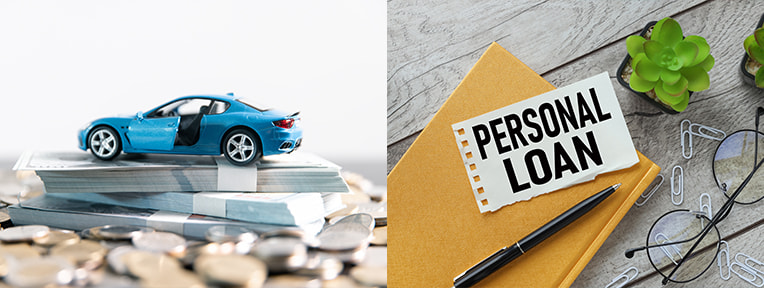
Car Loan vs Personal Loan: Which One Should You Choose?
Posted on Thursday, October 24th, 2024 | By IndusInd Bank
Buying a car is a major financial decision, and choosing the right loan option can make a significant difference in your overall cost and repayment experience. If you’re confused between a personal loan and car loan, this guide will help you understand the distinct features, interest rates, and eligibility criteria for both type of loans.
What is a Car Loan?
A car loan is a secured loan specifically designed to help individuals purchase a car. The car itself serves as collateral, meaning if the borrower fails to repay the loan, the lender has the right to repossess the vehicle.
Key Features of a Car Loan
- Secured Loan – The car is used as collateral until the loan is fully repaid.
- Lower Interest Rates – Car loans usually have lower interest rates compared to personal loans.
- Fixed Tenure – Loan repayment terms generally range from 1 to 7 years.
- Loan Amount – Up to 85-100% of the car’s on-road price can be financed.
- Restrictions on Use – The loan amount can only be used to buy a car.
A car loan is a great option for new car buyers who prefer lower interest rates and structured repayment plans.
What is a Personal Loan?
A personal loan is an unsecured loan that can be used for any purpose, including buying a car. Since it does not require collateral, the interest rates are typically higher than car loans.
Key Features of a Personal Loan
- Unsecured Loan – No need to pledge your car or any asset as security.
- Higher Interest Rates – Compared to car loans, personal loans have higher interest rates.
- Flexible Use – The loan amount can be used for anything, including buying a used car.
- Faster Approval – Since no collateral is required, personal loans are approved quickly.
- Repayment Tenure – Generally ranges from 1 to 5 years.
A personal loan is a good choice for used car buyers, people who do not want to pledge their car as security, or those who need additional funds beyond the car’s price.
Car Loan vs. Personal Loan Interest Rates
Interest rates play a key role in choosing between a car loan and a personal loan.
| Loan Type | Security Required | Typical Interest Rate Range |
| Car Loan | Yes | 7% – 10% p.a. |
| Personal Loan | No | 10% – 24% p.a. |
Car loans have lower interest rates because they are secured loans, whereas personal loans carry higher rates due to the lack of collateral.
Also Read: Unravelling the Link Between Employment and Personal Loan Eligibility
Car Loan vs. Personal Loan – Which is better for you?
As you now know the basics of both types of loans, if you are still wondering which is the ideal option for you – a car loan or a personal loan, here are some additional points to help you gain more clarity.
Opt for a Car Loan if:
- You want lower interest rates.
- You are buying a new car.
- You are comfortable with the car being collateral.
- You want a structured repayment plan.
Opt for a Personal Loan if:
- You want full ownership of the car from day one.
- You are buying a used car.
- You want flexibility in how you use the funds.
- You do not want to pledge your car as security.
Difference Between Car Loan vs Personal Loan
| Feature | Car Loan | Personal Loan |
|---|---|---|
| Collateral Required | Yes, the car is pledged as security. | No, completely unsecured. |
| Interest Rates | Lower (7% – 12% p.a.). | Higher (10% – 24% p.a.). |
| Loan Amount | Up to 100% of the car’s value. | Based on income and creditworthiness. |
| Repayment Tenure | Up to 7 years. | Flexible, up to 5 years. |
| Purpose | Can only be used to purchase a car. | Can be used for anything, including buying a car. |
| Processing Time | Slightly longer due to documentation. | Fast approval, often within 24-48 hours. |
| Ownership | The lender retains ownership until full repayment. | Full ownership from the start. |
Points to Remember While Choosing a Car Loan or Personal Loan
Before making a decision, keep these important factors in mind:
- Loan Tenure & EMI Affordability – Choose a tenure that keeps EMIs manageable.
- Total Interest Payable – A lower interest rate reduces the overall loan cost.
- Processing Fees & Hidden Charges – Banks charge processing fees, prepayment penalties, and foreclosure charges.
- CIBIL Score – A higher credit score improves your chances of getting a loan with lower interest rates.
- Prepayment Option – Check if the lender allows prepayment or foreclosure without heavy penalties.
Wrapping Up
Both car loan and personal loan are convenient financing options but serve different financial needs. Before applying, compare loan options, check interest rates, and calculate your EMI affordability to make a well-informed financial decision.



 Offers
Offers Rates
Rates Debit Card Related
Debit Card Related Credit Card Related
Credit Card Related Manage Mandate(s)
Manage Mandate(s) Get Mini Statement
Get Mini Statement
 categories
categories Bloggers
Bloggers Blog collection
Blog collection Press Release
Press Release


